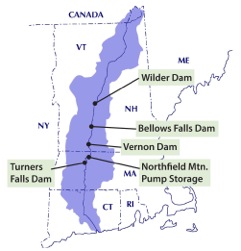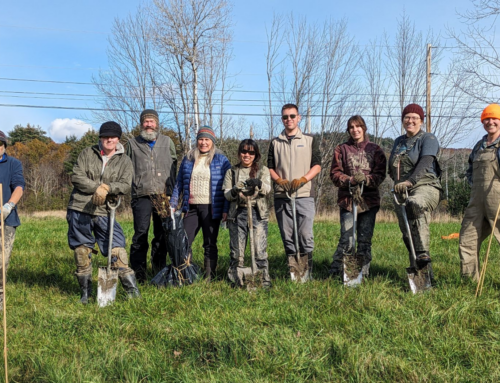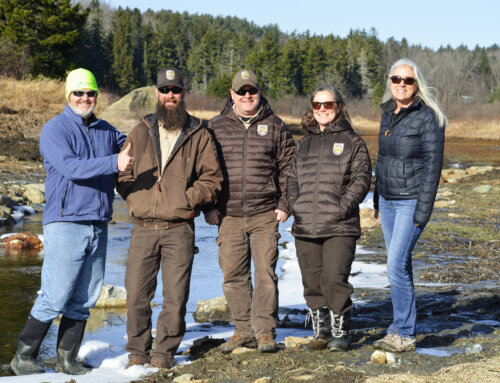
Here’s your latest update on the hydropower relicensing process for the five facilities in MA, NH and VT along the Connecticut River: the Wilder, Bellows Falls, Vernon, and Turners Falls Dams and the Northfield Mountain Pumped Storage Station.
The next six months are important in the now six-year long relicensing of these 5 hydropower projects. We expect final license applications to be submitted around April 2020. We have been working hard to ensure that these applications include a good deal for the public. Unfortunately negotiations with the owners of the MA facilities have remain stalled and we aren’t getting a lot of feedback from the owners of the VT and MA projects.
To keep the decision makers focused on the importance of these projects we continue to work with elected and appointed officials, including a recent meeting with NH congressional staffers as well as high-level agency staff in VT and NH.
And we continue to explore solutions that can mitigate the loss of energy from the change in operations that will come with the new licenses. This includes working with experts to evaluate the potential of advanced battery storage, such as what is deployed at solar farms, to be deployed at run-of-river hydropower dams.
Several recent proposed rules by the Trump administration are breath-taking in their audacity. These rules attempt to kneecap key environmental statutes (Endangered Species Act and Clean Water Act) and could directly affect this relicensing. The Trump administration’s proposed rules aim to amend these statutes’ clear intentions and overturn established legal precedent.
Read the full update below, including links for more details.
CRC Opposes EPA’s Proposed Rule to Weaken State & Tribal Authority
In August, 2019 the U.S. EPA released a proposed rule that would make significant changes to procedures under Section 401 of the Clean Water Act (CWA). Currently, CWA Section 401 gives states and tribes the right to veto or place conditions on activities requiring a federal license or permit that may result in a discharge. This ensures that projects, such as federal hydropower dam licensing, will not violate state water quality standards.
Connecticut River Conservancy recently submitted comments on the rulemaking in coordination with the Hydropower Reform Coalition. Our comments stressed that the proposed changes would serve to make the permitting process more confusing and are contrary to the plain language and goals of the Clean Water Act to “restore and maintain the chemical, physical, and biological integrity of the Nation’s waters.” Read the submitted comments.
Recreation Recommendations Submitted
CRC and Appalachian Mountain Club (AMC) collaborated on recreation recommendations for all five hydropower projects. We have created a unified set of recommendations to span all projects because we see the relicensing of these five facilities along the Connecticut River as part of a large ecosystem with a regional economic impact. We submitted our recommendations to both Great River Hydro, FirstLight, and FERC outside of any particular comment deadline. FERC and the companies can use our suggestions as they proceed in filing relicensing documents. FirstLight has indicated that it will submit a draft recreation management plan as part of a revised final license application; we encourage Great River Hydro to do the same. Read the submitted recommendations.
Facilities in MA, Owned by FirstLight
FirstLight has submitted several outstanding study reports in recent months and we believe they are now able to prepare a revised license application. We have not had any settlement meetings in over a year.
Facilities in VT / NH, Owned by Great River Hydro
Vernon Low Impact Hydro Certification Application
Dartmouth Engineering Students Examining Battery Storage as Alternative to Hydro-Peaking
CRC is working with three Dartmouth engineering students through the Dartmouth Social Impact Practicum to develop an analysis of integrating utility-scale battery storage into the business models for peaking hydroelectric facilities. This project will use best available data to understand to what extent battery storage may be used to replace lost revenue and ability to meet peak demands, thereby enabling projects to modify their use of the river but still maintain revenue from peaking.
Meeting with Congressional Representatives
CRC, fellow stakeholders, and local landowners concerned about erosion issues in the Great River Hydro project area met with U.S. Congresswoman Annie Kuster (D-NH) and staff from U.S. Senator Shaheen (D-NH) and Senator Hassan’s (D-NH) offices in August. The meeting was to make sure the Congresswomen understand local property owner’s concerns about how project operations contribute to the riverbank erosion.
The Process From Here
We continue to communicate with river stakeholders and work on preparing a set of recommendations regarding streambank management.







